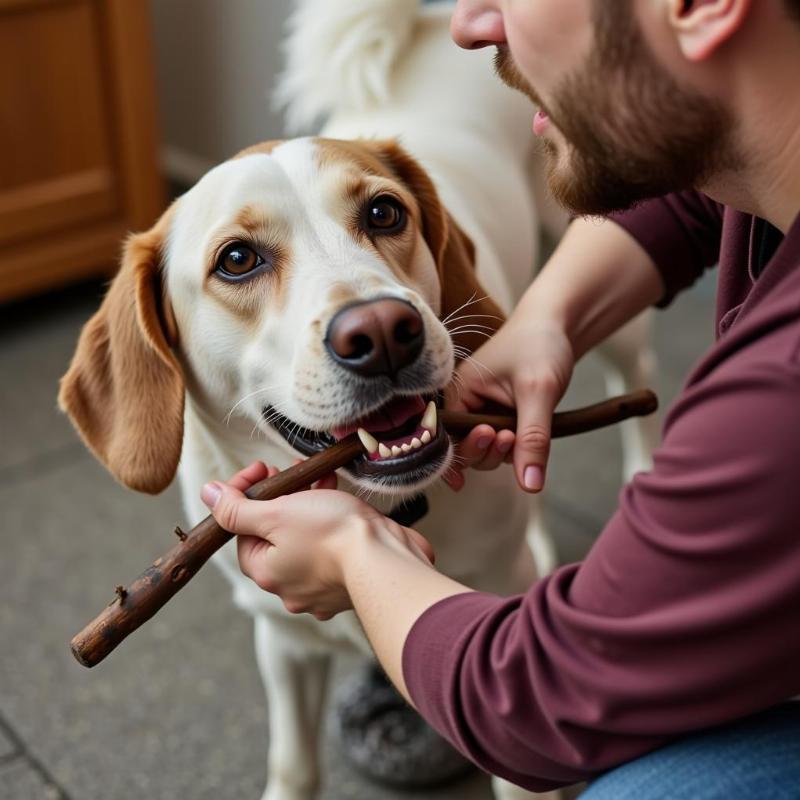If your dog ate a stick, you’re likely feeling worried. This is a common problem, and knowing how to react can make all the difference. This article will guide you through the necessary steps, from assessing the situation to seeking veterinary care, offering peace of mind and practical advice for dog owners across the US.
Assessing the Situation After Your Dog Eats a Stick
First, take a deep breath. Not all stick-eating incidents require a frantic trip to the vet. Observe your dog closely. Is he acting normally? Is he vomiting, drooling excessively, or showing signs of discomfort? The size and type of stick matter. A small twig is less concerning than a large, sharp branch. Was it a cooked skewer stick, potentially containing seasonings toxic to dogs? Take note of these details, as they will be helpful if you need to consult a veterinarian.
 Dog eating a stick – Checking the dog
Dog eating a stick – Checking the dog
When to Seek Immediate Veterinary Care
Certain signs warrant immediate veterinary attention. If your dog is choking, having difficulty breathing, or exhibiting excessive drooling, don’t hesitate to call your vet or the nearest emergency animal hospital. Bloody vomit or stool, lethargy, and abdominal pain are also red flags. If the stick was sharp, or if you suspect it may have splintered, immediate veterinary care is crucial. Internal injuries from swallowed sticks can be serious and require prompt treatment.
What to Expect at the Vet’s Office
If you need to take your dog to the vet, be prepared to provide as much information as possible. The vet will likely conduct a physical exam and may recommend X-rays or other diagnostic tests to assess the extent of any internal damage. Treatment options vary depending on the specific situation, ranging from inducing vomiting to surgical removal of the stick.
Preventing Stick Chewing
Prevention is always the best medicine. While it’s impossible to completely eliminate the risk of a dog eating a stick, you can take steps to minimize it. Provide plenty of safe and engaging chew toys. Regular exercise and mental stimulation can also help redirect your dog’s chewing instincts. Training your dog to “drop it” or “leave it” can be invaluable in these situations. Consistent training and positive reinforcement can help your dog learn to avoid sticks altogether.
What if My Dog Frequently Eats Sticks?
If your dog has a habit of eating sticks, it’s crucial to address the underlying cause. This behavior could stem from boredom, anxiety, or even a nutritional deficiency. Consult with your veterinarian or a certified dog trainer to identify the root cause and develop a behavior modification plan. They can help you understand why your dog is attracted to sticks and provide strategies to curb this potentially dangerous habit.
Conclusion
Discovering your dog ate a stick can be a stressful experience. By remaining calm, assessing the situation, and knowing when to seek professional help, you can ensure your furry friend receives the best possible care. Remember that prevention is key, so focus on providing safe alternatives and training your dog to avoid sticks in the first place. If your dog eats a stick, remember these tips and don’t hesitate to contact your veterinarian for guidance.
FAQ
- What are the most common signs of a problem after a dog eats a stick? Vomiting, difficulty breathing, drooling, lethargy, bloody stool, and abdominal pain are all potential signs of a problem.
- Can a stick puncture a dog’s stomach? Yes, sharp sticks can cause internal injuries, including punctures to the stomach, intestines, and other organs.
- Should I induce vomiting if my dog ate a stick? Never induce vomiting without consulting your veterinarian first. It could worsen the situation depending on the type and size of the stick.
- How can I train my dog to stop eating sticks? Positive reinforcement training, teaching commands like “leave it” and “drop it,” and providing plenty of alternative chew toys can be effective.
- Are certain types of sticks more dangerous than others? Cooked skewers, sticks with sharp edges, and larger branches pose greater risks.
- What should I do if my dog swallows a small twig? Monitor your dog closely for any signs of discomfort. If they act normally, they may pass the twig without issue. However, if you’re concerned, consult your vet.
- My dog ate a stick a week ago, and now he’s not eating. Should I be worried? Yes, a sudden change in appetite could indicate a problem. Consult your veterinarian immediately.
Related Articles
Beautdogs.us is your premier resource for all things dog-related in the USA. We offer expert advice on dog breeds, care, and products. Whether you’re a new dog owner or a seasoned pro, Beautdogs.us provides reliable information to enhance your dog’s well-being. Connect with us for personalized advice and support at [email protected] or call us at +1 501-555-7529. Visit Beautdogs.us for more valuable insights into the world of canine companionship.